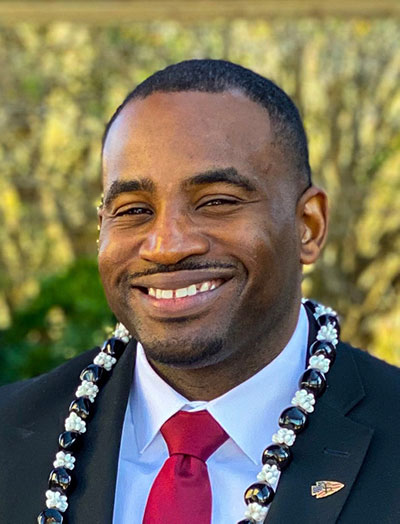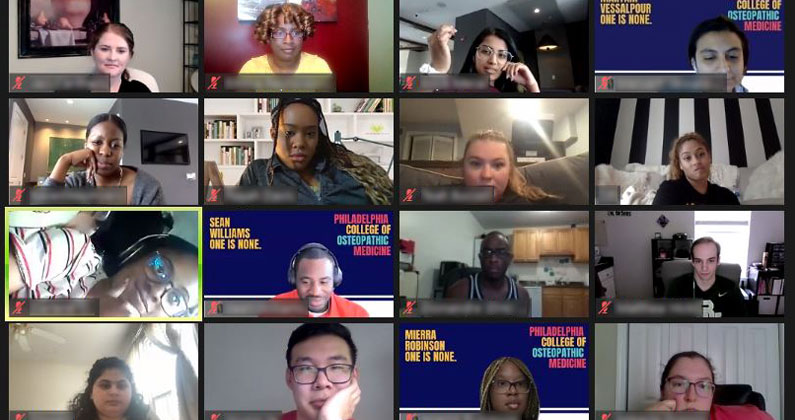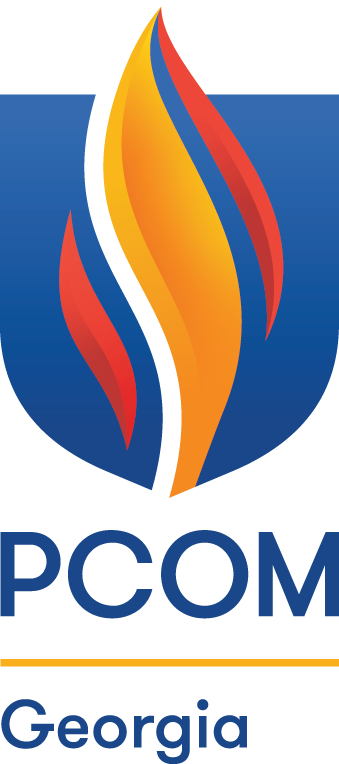Online Team Dynamics Course Provides Support to Non-Profits
August 12, 2021 by Sean Williams (MS/Biomed '22)
by Sean Williams (MS/Biomed '22)
Seventeen graduate students in the team dynamics course from both the Suwanee and
Philadelphia campuses completed the online class by supporting the missions of not-for-profit
organizations near and far. The course, part of the Master's in Biomedical Sciences curriculum in the Organizational Leadership concentration and the Certificate of Advanced Graduate Studies program, pivoted from an in-person class to a virtual format last year, but didn’t
lose its focus on giving back.
Drafting a team charter
At the start of the program, students were placed in teams and tasked to create a
team charter that each member would agree to follow. A team charter is a document
developed in a group/team setting that clarifies team direction while establishing
boundaries. The charter also provides the information needed to reduce the risk of
rework, enabling the team to get it right the first time.
Stages of a team
Students were taught early in this course that teams aren't forged overnight. Instead,
they go through different stages, known as forming, storming, norming, performing
and adjourning. First, the team needs to develop. This is when members start working
together. During this stage, there is storming and forming. Storming is when the team
enters a situation where they need to work together, but they may not be able to find
common ground with the other team members. The norming stage takes place after everyone
is more comfortable working with members of their team. Performing happens once all
the group members have grown to know each other and can function as an effective unit
to pursue their shared goals. Finally, like many teams, after the job, task or project
is complete, the adjourning stage is reached, signifying the team's end.
Overcoming team dysfunction
As each team transitioned through the stages, they had to be mindful of the five dysfunctions
of a team: trust, conflict, commitment, accountability and results. Trust is the foundation
for every team. To build it, there must be vulnerability among the team members. Each
group found its own ways to build trust.
Students learned throughout the course that conflict is inevitable, and most importantly,
not all conflict is destructive. Every member of the team was encouraged to speak
freely and respectfully.
From the first day of the course, class members were committed to learning how to
become influential leaders. Thanks to creating the team charter, each team member
was held accountable for their assigned roles and responsibilities. Results were measured
through the completion of each team's service project, various presentations and individual
growth through the course.
Leading teams through conflict
Throughout the team dynamics course, students learned about situations that teams
may face.
“It was important to include real-time content affecting teams now in the midst of
COVID-19,” adjunct faculty member Emma Reynolds-Middleton said.
One challenge for the students was dealing with remote teams, something they have
experienced over the past year during the pandemic. Teams learned to deal with technological
difficulties, scheduling challenges, and connecting with peers through video conferencing
and chat rooms when they knew each another only slightly.
Throughout the course, students were taught how to apply strategies to overcome conflicts,
break down communication barriers, and respect multigenerational differences on teams.
By repeatedly working in small teams throughout the semester, students received experience
leading remote teams. They also evolved as contributors on highly functional teams.

A look at the team service projects
The virtual environment did not stop each team from finding a way to support various
organizations. For example, each team selected and was able to support non-profit
organizations. The teams assisted the following organizations:
- Helping Mamas – Team Fantastic Four included Aaliyah Brown (MS/Biomed ‘22), Dhwani Mistry (MS/Biomed
‘22), Najah Davis (MS/Biomed ‘22) and Darlene Okafor (MS/Biomed ‘22). They assisted
with counting, organizing, sorting and distributing donated clothing and sanitary
items to women and children across Georgia. They sorted 2,180 items of clothing, shoes
and diapers.
- VocaliD – Team JM2 consisted of Jaci Carithers (MS/Biomed ‘22), Mikayla Grenon (MS/Biomed
‘22) and Matthew Hicks (MS/Biomed ‘22). This team provided up to ten hours of voice
recordings contributing to the growth of the organization's database utilized to reverse
engineer digital voices for those that are unable to speak on their own.
- Atlanta Community Food Bank – Team Young Money included Priya Merai (MS/Biomed ‘22), Young Ye (MS/Biomed ‘22)
and Raven Waymyers (MS/Biomed ‘22). The team did their part to fight hunger in the
community by stocking shelves, sorting and packaging food, assembling grocery carts
and breaking down used packaging.
- Include Me Advocacy Group in Tennessee – Team One is None compromised of Langston Scott (CAGS ’22), Sean Williams
(MS/Biomed ‘22), Maryam Vessalpour (MS/Biomed ‘22 )and Mierra Robinson (MS/Biomed
‘22). Team members remotely assisted individuals with neurogenetic conditions within
the special needs community, such as Williams Syndrome and Asperger’s syndrome, with
their workforce development workshop. The workshop helped people identify their future
educational and career goals.
- 7Cups – Team The Trinity included Teah Bussell (MS/Biomed ‘22), Tiffani Holness (MS/Biomed
‘22) and Dionandre King (DO ’22) from PCOM’s Philadelphia campus). Team members served
as online volunteer listeners to people who are seeking help with mental health issues.
Lessons learned
Working in teams gave students the opportunity to learn and blend strengths within
their teams. It also allowed for learning opportunities and conflict resolution. In
all cases, effective leadership remained the core ingredient to healthy and functional
teams.
In addition, students gained a heightened sense of perspective about agency needs.
Students gained first-hand experience on how teams work together, and they acknowledged
the importance of effective communication (among volunteers, between volunteers and
others). The learning opportunity was invaluable.
About PCOM Georgia
PCOM Georgia has been serving students and the community for 20 years as a branch campus of Philadelphia
College of Osteopathic Medicine (PCOM), a private, not-for-profit, accredited institution
of higher education established in 1899. Located in Suwanee (Gwinnett County), PCOM
Georgia offers doctoral degrees in osteopathic medicine, pharmacy and physical therapy.
Graduate degrees are offered in biomedical sciences, medical laboratory science and
physician assistant studies. The campus joins PCOM South Georgia in Moultrie in helping
to meet the healthcare needs of the state. Emphasizing "a whole person" approach to
care, PCOM Georgia focuses on educational excellence, interprofessional education
and service to the community. For more information, visit pcom.edu or call 678-225-7500. The campus is also home to the Georgia Osteopathic Care Center,
an osteopathic manipulative medicine clinic, which is open to the public by appointment.
For more information, visit pcomgeorgiahealth.org.
Contact Us
For general media inquiries, please contact the Office of Marketing and Communications
at 215-871-6300 or communications@pcom.edu. Visit our media relations page to view contact information for public relations personnel.
Connect with PCOM Georgia

 by Sean Williams (MS/Biomed '22)
by Sean Williams (MS/Biomed '22)
